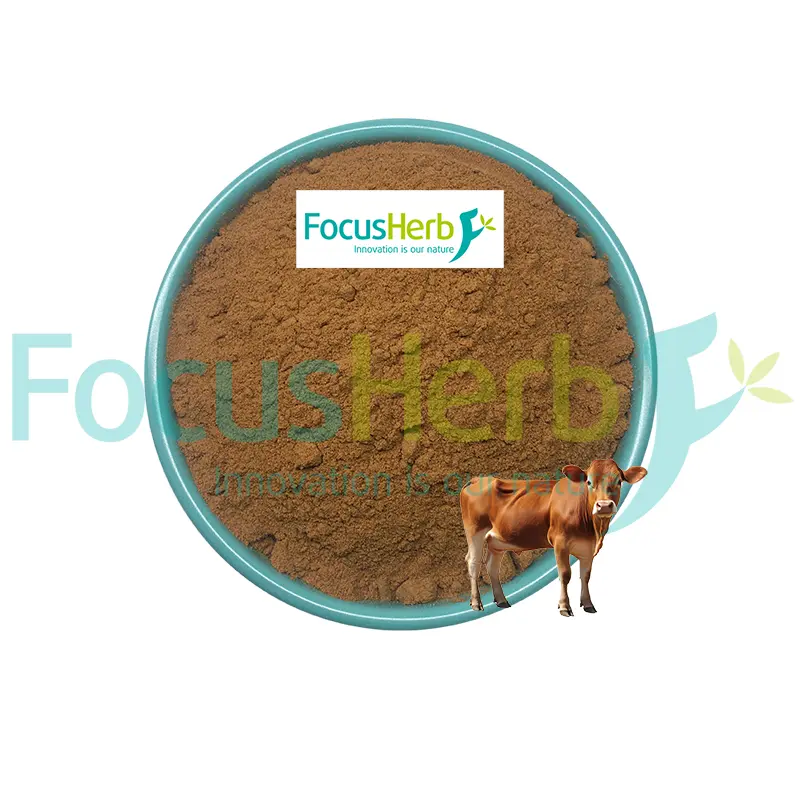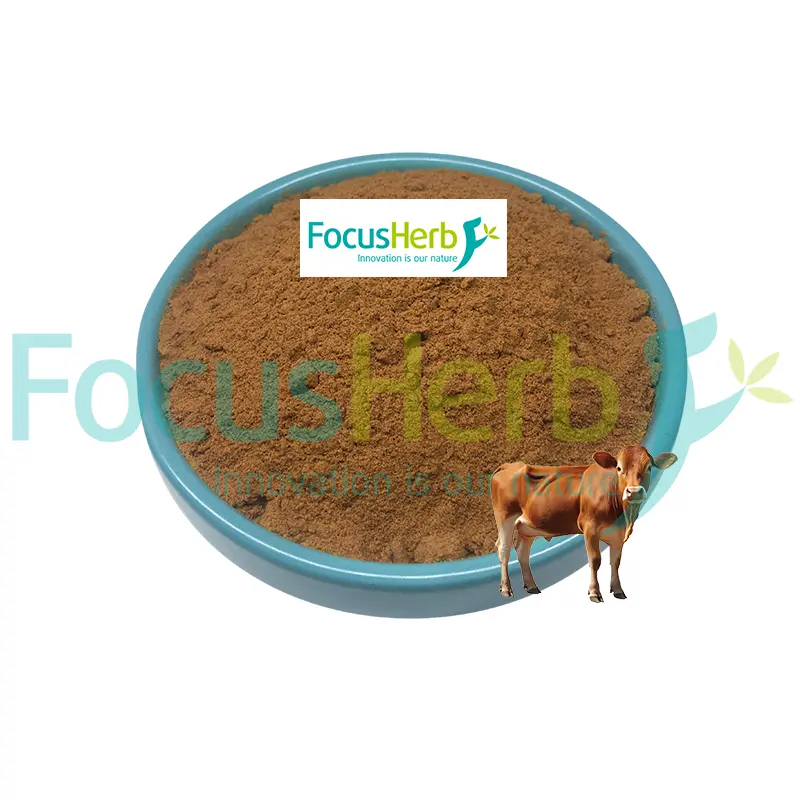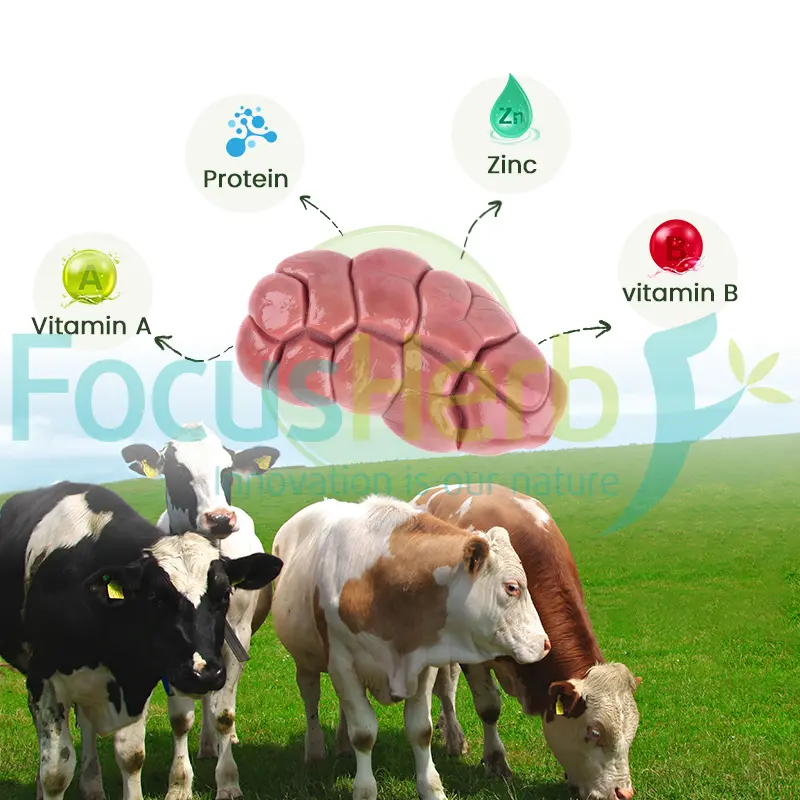Amidst the growing pursuit of health and wellness, beef kidney powder, as an emerging nutritional supplement, is gradually gaining popularity and attracting increasing attention. It’s a rising star in the health industry, boasting a wealth of nutritional benefits and numerous potential health benefits. From boosting immunity to promoting metabolism, improving digestion, and alleviating fatigue, beef kidney powder, with its unique nutritional profile, has demonstrated remarkable promise in the health field. Let’s delve deeper into the secrets of beef kidney powder, uncovering its mysteries and gaining a comprehensive understanding of its nutritional content, benefits, methods of consumption, and its current market status and prospects.
What is beef kidney powder?
Beef kidney powder, as the name suggests, is a powdered substance obtained from cow kidneys through a series of processing steps. The production process is typically quite delicate, starting with the selection of fresh, healthy beef kidneys, a crucial first step in ensuring the quality of the beef kidney powder. Only high-quality raw materials can lay a solid foundation for subsequent processing and the quality of the finished product. Just like building a tall building, a solid foundation is essential. Fresh, healthy bovine kidneys are the cornerstone of this “healthy building.” During selection, the kidneys are rigorously inspected for appearance, color, and texture to ensure they are free of disease and contamination.
Next, the selected bovine kidneys are cleaned to remove surface impurities and blood to ensure the purity of the raw material. The cleaned bovine kidneys undergo further processing, typically through pulverization and drying. The pulverization process breaks the kidneys into fine particles for easier drying and processing. Drying is crucial, removing moisture from the kidneys, preventing microbial growth and extending the shelf life of the bovine kidney powder. There are various drying methods, including hot air drying and vacuum drying. Different drying methods may affect the nutritional content and quality of the bovine kidney powder. For example, hot air drying is faster, but the high temperature may destroy some heat-sensitive nutrients. Vacuum drying better preserves nutrients, but is relatively expensive. Manufacturers will select the appropriate drying method based on actual conditions and product positioning. After a series of processing steps, the final product, beef kidney powder, exhibits a unique appearance and characteristics. Its color is typically brownish-yellow or off-white, reflecting the color of the kidney itself and the way it is handled during processing. It typically has a fine powdery texture, delicate to the touch; gently rubbing reveals its delicate texture. In terms of odor, beef kidney powder has a distinctive odor, which may be slightly fishy, but this odor is not pungent or unpleasant, but rather a light, kidney-related aroma. This odor, to a certain extent, reflects the authenticity and naturalness of the beef kidney powder.
Nutritional Secrets Revealed 
Beef kidney powder has attracted considerable attention due to its rich nutritional profile. These nutrients work synergistically to safeguard human health. Let’s take a closer look at the main nutrients in beef kidney powder.
(I) Protein
Beef kidney powder is rich in high-quality protein, containing all essential amino acids. Protein, as a building block of the immune system, plays a key role in every aspect of the immune response. When the body is invaded by pathogens, immunoglobulins (antibodies), essential weapons of the immune system, come into play. These antibodies are essentially proteins. The protein in beef kidney powder provides essential amino acids for antibody synthesis, ensuring normal antibody production. A sufficient protein supply helps rapidly produce sufficient quantities and types of antibodies, enhancing the humoral immune response.
Immune cells, such as lymphocytes and macrophages, also rely on protein for their structure and function. During the immune defense process, these cells continuously proliferate, differentiate, and perform their functions, requiring protein to build new cell structures and repair damaged parts. For example, during an inflammatory response, after macrophages engulf pathogens, proteins are used to restore the structure and function of the macrophages, enabling them to continue their immune response. Proteins also participate in maintaining the structural integrity and normal function of immune cells, ensuring they can effectively perform tasks such as immune surveillance, antigen recognition, and immune killing. They are essential for the repair and growth of human tissues.
(II) Vitamins
Vitamin A: Beef kidney powder contains a certain amount of vitamin A, which is essential for eye health. It is a key component of rhodopsin in the retina. Rhodopsin is a photosensitive pigment that absorbs light and triggers visual nerve impulses in low light conditions, allowing us to see clearly in dim conditions. When rhodopsin in the retina is broken down by light exposure, sufficient vitamin A is required to regenerate it. Vitamin A deficiency can lead to night blindness, impairing night vision. Furthermore, vitamin A plays a vital role in maintaining the health of ocular surface tissues, such as the cornea. It promotes the growth and differentiation of corneal epithelial cells, maintains corneal transparency, and prevents corneal dryness and clouding. B vitamins: These include vitamin B1 (thiamine), vitamin B2 (riboflavin), vitamin B6 (pyridoxine), and vitamin B12 (cobalamin). Beef kidney powder is rich in these B vitamins. Vitamin B1 plays a key role in energy metabolism. The normal functioning of the immune system requires a significant amount of energy, especially when immune cells are engaged in activities such as phagocytosis and killing pathogens. Vitamin B1 is involved in the conversion of carbohydrates into energy, providing power for immune cells and ensuring effective immune function. Vitamin B2, as a component of many oxidoreductases, participates in redox reactions within cells and is a crucial coenzyme in cellular respiration. During immune cell metabolism, it helps generate sufficient energy to maintain immune cell activity. Vitamin B2 also plays a role in maintaining the health of the skin and mucous membranes, which are the body’s first line of defense against pathogens. Vitamin B6 and vitamin B12 play key roles in amino acid metabolism and cellular DNA synthesis. Within the immune system, these vitamins are crucial for the proliferation, differentiation, and normal function of immune cells. For example, vitamin B6 regulates the growth and differentiation of lymphocytes, while vitamin B12 is important for maintaining normal blood cell production and immune cell metabolism.
Vitamins C and E: Beef kidney powder also contains small amounts of vitamins C and E, but their roles are significant. Vitamin C is a powerful antioxidant that protects immune cells from free radical damage. It also participates in collagen synthesis, helping to maintain the integrity of the skin and mucous membranes and strengthen the body’s defenses. Vitamin E is also an antioxidant, primarily found in cell membranes, where it prevents lipid peroxidation, protects the structure and function of immune cells, and enhances the body’s immune system.
(III) Minerals
Zinc: Beef kidney powder is a good source of zinc. Zinc plays a variety of important roles in the immune system, serving as a component or activator of numerous enzymes. For example, metalloenzymes composed of zinc play key roles in processes such as DNA replication, RNA transcription, and protein synthesis, all of which are essential for the proliferation and differentiation of immune cells. Zinc also regulates immune cell activity, enhancing the phagocytic capacity of phagocytes and the immune response of lymphocytes, playing a key role in the body’s immune defense and immune surveillance. Zinc also participates in the synthesis and activation of multiple enzymes within immune cells, regulates the expression and function of immune cell surface receptors, and influences immune cell recognition of pathogens and signal transduction, making it crucial for maintaining normal immune function.
Selenium: Beef kidney powder contains selenium, which is a key component of glutathione peroxidase. This enzyme scavenges free radicals such as hydrogen peroxide and organic peroxides in the body, mitigating oxidative stress damage to immune cells. During immune responses, immune cells produce a large number of free radicals. Selenium, through its antioxidant properties, protects immune cells and maintains their normal function. Selenium also regulates immune cell activity and enhances the body’s immune response, providing both antioxidant and immunomodulatory benefits.
Iron: Iron also accounts for a significant proportion of beef kidney powder. Iron is a key component of hemoglobin and is responsible for oxygen transport. Adequate oxygen supply is crucial for the normal metabolism and function of immune cells, as they require energy to perform their immune functions, and energy production relies on aerobic respiration. Furthermore, iron is a component of some enzymes, participating in redox reactions within cells and supporting immune cell metabolism.
(IV) Other Ingredients
In addition to the main nutrients listed above, beef kidney powder may also contain other ingredients, such as coenzyme Q10, peptides, and nucleotides. Coenzyme Q10 is a fat-soluble antioxidant that plays a key role in cellular energy metabolism and antioxidant defense. It is primarily found in mitochondria, participating in electron transport in the cellular respiratory chain and helping cells produce energy. For immune cells, an adequate energy supply is crucial for maintaining their normal function. Coenzyme Q10 also protects cell membranes from free radical attack, reducing oxidative damage and playing a crucial role in maintaining the health of immune cells.
Peptides may also regulate immune function. Some peptides can stimulate the proliferation and activity of immune cells, enhancing the body’s immunity. Nucleotides play an important role in cell growth, development, and reproduction. They may also participate in immune regulation and help maintain the normal function of the immune system.
Benefits and Functions of Beef Kidney Powder
(1) Immunity Enhancement
Beef kidney powder excels in boosting immunity, and its mechanism of action is primarily reflected in the following key aspects. From the perspective of immune cell formation, protein, as a key nutrient in beef kidney powder, is the cornerstone of immune cells. Immune cells such as lymphocytes and macrophages contain protein in their cell membranes, various enzymes in their cytoplasm, and intracellular signaling molecules. The protein in beef kidney powder provides essential amino acids for immune cell synthesis. When the body is invaded by pathogens, these amino acids act like the building blocks of the immune cell “building block,” ensuring the proliferation of immune cells and maintaining a stable immune cell population, providing the immune system with ample “strength” to defend against pathogens.
In terms of enhancing immune organ function, the nutrients in beef kidney powder play a vital role in maintaining the normal structure and function of these organs. Take the thymus, for example, as a key site for T lymphocyte maturation, and protein and vitamin A are crucial for maintaining its normal structure and function. They act like “guardians” of the thymus, ensuring the proper development of mature T lymphocytes. T lymphocytes play a central role in cellular immunity and immune regulation, recognizing and attacking cells infected with pathogens or cancer cells, thereby enhancing the overall immune system’s effectiveness.
Beef kidney powder also balances the immune response. During the immune response, the immune system must effectively eliminate pathogens while avoiding excessive damage to its own tissues. Certain ingredients in beef kidney powder, such as antioxidants like vitamin E and selenium, act as “regulators” for the immune system, inhibiting excessive inflammatory responses. When immune cells fight pathogens, they may release inflammatory mediators. Excessive release of these mediators can damage the body’s own tissues. Antioxidants like vitamin E and selenium can reduce the release of inflammatory mediators by immune cells, protecting the body from damage. Certain peptides can also regulate immune cell activity, promote the development of immune tolerance, prevent the onset of autoimmune diseases, and maintain a balanced and stable immune system.
(II) Relieving Fatigue
Beef kidney powder has a unique mechanism of action for relieving fatigue. From an energy perspective, beef kidney powder is rich in high-quality protein. This protein is broken down into amino acids in the human body, some of which are converted into glucose through gluconeogenesis to provide energy. When we experience fatigue after prolonged physical or mental exertion, the protein in beef kidney powder acts like a “power battery” to replenish our energy and restore our vitality.
Beef kidney powder also boosts metabolism, with B vitamins (such as vitamins B1 and B2) playing a key role in this process. Vitamin B1 is a coenzyme of the pyruvate dehydrogenase system in carbohydrate metabolism. It acts like a “key” that unlocks the door to converting carbohydrates into energy (ATP), helping the body efficiently convert carbohydrates in food into energy to power various bodily activities. Vitamin B2, as a component of flavin adenine dinucleotide (FAD) and flavin mononucleotide (FMN), participates in numerous redox enzyme reactions, ensuring the body’s efficient use of nutrients to generate energy, accelerating energy production and utilization, and thus helping the body recover faster. Certain ingredients in beef kidney powder may help regulate nervous system function and improve sleep quality. Good sleep is a crucial period for the body’s recovery and repair, like a comprehensive “maintenance” for the body. When sleep quality improves, organs and tissues in the body are able to fully rest and repair, and fatigue naturally decreases. By regulating nervous system function, beef kidney powder facilitates deep sleep, further alleviating fatigue.
(III) Promoting Vision Health
Beef kidney powder’s beneficial effects on vision health are primarily reflected in maintaining retinal function and protecting ocular surface tissue. In this regard, the synergistic effects of beef kidney powder, including vitamin A and zinc, are crucial for maintaining the normal regeneration and function of rhodopsin. Vitamin A is a crucial component of rhodopsin in the retina, acting as a key pillar of the rhodopsin “building.” When rhodopsin in the retina is broken down by light exposure, sufficient vitamin A is needed to regenerate it, ensuring clear vision in all lighting conditions, especially in dim light. Zinc participates in the metabolism of retinal (the active form of vitamin A), providing the necessary conditions for the synthesis and regeneration of rhodopsin and ensuring its stable function.
The various nutrients in beef kidney powder, such as B vitamins and selenium, provide comprehensive nutritional support for retinal cells and protect them from damage. B vitamins participate in the energy metabolism and synthesis of substances in retinal cells, acting as “fuel” and “building materials” for them, ensuring they have sufficient energy and substances to maintain normal physiological functions, such as the reception and transmission of light signals. Selenium’s antioxidant effect can mitigate oxidative stress damage to retinal cells, preventing premature aging and cell death, maintaining retinal integrity and function, and thus promoting healthy vision.
In terms of protecting ocular surface tissues, the vitamin A in beef kidney powder promotes the growth and differentiation of corneal epithelial cells, maintaining corneal transparency and smoothness. The cornea is like the “window” of the eye, and its transparency directly affects vision. When corneal epithelial cells are damaged or diseased, corneal opacity results, affecting light refraction and the path of light entering the eye, thereby reducing vision. The vitamin A in ox kidney powder promotes normal metabolism and repair of corneal epithelial cells, acting like a “window” wipe, helping to maintain corneal health and improve vision.
The nutrients in ox kidney powder may also have a regulatory effect on tear secretion. For example, zinc can regulate the immune function and inflammatory response of the ocular surface, indirectly affecting the secretory function of the lacrimal gland. Proper tear secretion is essential for maintaining ocular surface moisture. It prevents dryness, damage to corneal and conjunctival epithelial cells, and blurred vision caused by dryness, acting like a “lubricant” for the eyes, ensuring constant comfort.
(IV) Other Potential Benefits
Ox kidney powder also has certain cosmetic benefits. The vitamin A it contains can promote the growth and repair of skin cells, making the skin smoother and more delicate, like a deep “skin care” treatment. Iron increases blood oxygen levels, making the skin more rosy and radiant, seemingly infusing it with vitality and energy. The protein and other nutrients in beef kidney powder provide energy, boost metabolism, and help eliminate toxins, thereby enhancing beauty and skin tone, leaving skin radiant from the inside out.
As for brain health, beef kidney powder is rich in iron, which helps maintain red blood cell count and deliver sufficient oxygen to the brain. The brain has a high oxygen demand, and an adequate oxygen supply acts as a constant “fuel,” improving productivity and memory. For students and office workers, appropriate consumption of beef kidney powder can improve learning and work efficiency and sharpen thinking.
For men, beef kidney powder can be an auxiliary treatment for kidney deficiency, strain, and lower back pain. Traditional Chinese Medicine believes that beef kidneys can replenish kidney qi and nourish essence. Symptoms of kidney deficiency and strain in men often include lower back pain, weakness in the feet and knees, impotence, and frequent urination. Consuming beef kidney powder can replenish nutrients needed by the kidneys and enhance kidney function. For example, the protein, vitamins, and trace elements in it can nourish kidney tissue and improve the kidney’s metabolic capacity, thereby alleviating symptoms of kidney deficiency, essentially injecting a “spring of vitality” into the kidneys. Oxen kidney powder can also be taken in combination with other Chinese medicinal herbs such as Eucommia ulmoides and Cistanche deserticola to enhance its kidney-tonifying and yang-strengthening effects.
Usage Instructions and Recommendations
(I) Usage Methods
Beef kidney powder can be consumed in a variety of ways, depending on your taste and needs. The most convenient way is to add it directly to porridge. When cooking rice or oatmeal porridge, add an appropriate amount of beef kidney powder when it’s almost done, stir well, and simmer for a few minutes to fully incorporate. This not only adds nutrients to the porridge, but also allows the flavor of the beef kidney powder to blend with the aroma, creating a richer taste. It’s like a bowl of hot porridge on a winter’s day—it not only warms the body but also provides a nutritional boost.
Beef kidney powder is also a great choice for soups. Whether it’s vegetable, meat, or seafood, sprinkle an appropriate amount of beef kidney powder into the soup after it’s cooked and stir well. Beef kidney powder adds a unique flavor to the soup, making it more delicious and nutritious, while also providing a more comprehensive nutritional base. For example, adding beef kidney powder to vegetable soup combines the freshness of the vegetables with the nutritional value of the beef kidney powder, providing a rich source of vitamins, minerals, and protein. Beef kidney powder can also be used with breakfast cereals. Sprinkle the powder over breakfast cereals like cornflakes or whole-wheat cereal, then add milk or yogurt and stir well before eating. This combination is not only convenient and quick, perfect for busy mornings, but also makes for a nutritious breakfast, providing ample energy for a full day of work and study.
If you enjoy cooking, try making an omelet with beef kidney powder. Beat eggs, add an appropriate amount of beef kidney powder, chopped vegetables (such as onions, green peppers, spinach), and a pinch of salt and pepper to taste. Stir well, then add a little oil to a frying pan, pour the mixture into the pan, and fry over low heat until golden brown on both sides. This omelet is not only delicious but also rich in protein, vitamins, and minerals, making it a nutritious dish.
Beef kidney powder can also be used in fruit salads. Chop your favorite fruit (such as apples, bananas, oranges, strawberries, etc.) into small pieces, place them in a bowl, add an appropriate amount of beef kidney powder and yogurt, and stir well. The sweetness of the fruit complements the nutritional value of the beef kidney powder, while the yogurt adds a rich texture, making this fruit salad a delicious and healthy snack or dessert.
(II) Recommended Serving Size
Generally speaking, the recommended daily intake of beef kidney powder is 3-5 grams. This intake is based on most people’s nutritional needs and tolerance. For an average adult, this dose can replenish the body’s essential nutrients and maximize the benefits of beef kidney powder, such as boosting immunity and relieving fatigue. For example, for an office worker who exercises moderately and works a moderate workload, consuming 3-5 grams of beef kidney powder daily can help replenish energy expended during exercise and work, boost immunity, and prevent disease.
It is important to note that individual differences are crucial when consuming beef kidney powder. Physical conditions, nutritional needs, and health goals vary from person to person, so the recommended intake should be adjusted accordingly. For example, children and the elderly may need to reduce their intake of beef kidney powder due to their relatively weaker physical functions and varying digestive and absorption abilities. The recommended daily intake for children is 1-2 grams, and for the elderly, 2-3 grams. Pregnant and breastfeeding women, due to their unique physiological needs, should consult a doctor or nutritionist before consuming beef kidney powder to determine the appropriate intake amount.
For individuals who expend a lot of energy, such as those engaged in high-intensity physical labor or athletes, as well as those with weakened immune systems and prone to fatigue, beef kidney powder intake can be increased under the guidance of a doctor or nutritionist. For example, during high-intensity training, athletes experience significantly increased nutritional needs and may need to consume 5-8 grams of beef kidney powder daily to meet their protein, vitamin, and mineral needs, aid recovery, and enhance performance. However, excessive intake should be avoided to avoid burdening the body, such as increasing metabolic stress on the kidneys.
Precautions for Use
(1) Groups Not Suitable for Consumption
Although beef kidney powder is nutritious, it is not suitable for everyone. Patients with cardiovascular and cerebrovascular diseases should consume it with caution. Due to its high cholesterol content, consumption by such individuals may further elevate blood cholesterol levels, increase blood viscosity, and worsen the risk of atherosclerosis. This, in turn, increases the burden on cardiovascular and cerebrovascular systems, hindering disease control.
Those with sexual promiscuity should also avoid excessive consumption of beef kidney powder. While beef kidney powder has certain kidney-tonifying and yang-strengthening properties, excessive consumption by those with sexual promiscuity may lead to an excess of yang energy, disrupting the balance of yin and yang, thereby increasing the burden on the body and negatively impacting health.
Patients with gout and chronic kidney diseases, such as chronic nephritis and nephrotic syndrome, should avoid consuming beef kidney powder. This is because beef kidney powder contains high levels of uric acid and purines. Gout patients already have impaired purine metabolism, and consumption can increase uric acid production in the body, leading to a sharp rise in blood uric acid levels, triggering gout attacks, and exacerbating symptoms such as joint pain. Patients with chronic kidney disease have impaired kidney function and reduced ability to metabolize uric acid and purines. Consuming beef kidney powder further increases the metabolic burden on the kidneys, hindering the recovery of kidney function and the treatment of the disease.
(II) Food Combination Taboos
When consuming beef kidney powder, it’s important to be mindful of the food combination. Beef kidney powder should not be consumed with foods like watermelon. Watermelon, with its cooling properties and high water content, is a great summertime treat. However, consuming it with beef kidney powder reduces its warming and tonic effects. From a Traditional Chinese Medicine (TCM) perspective, beef kidney powder has warming and tonic properties, replenishing kidney qi and nourishing essence. The cooling properties of watermelon neutralize these warming and tonic effects, preventing them from fully exerting their nourishing properties. Consuming them together may also negatively impact the spleen and stomach. The spleen and stomach are crucial organs for digestion and absorption. For those with weak spleen and stomach or indigestion, combining beef kidney powder with watermelon can cause a double stimulus from the cold pathogen and indigestible foods, disrupting the spleen and stomach’s normal function, leading to symptoms such as indigestion, abdominal pain, and diarrhea. (III) Purchase and Storage
To ensure safe consumption and optimal nutritional benefits, purchase beef kidney powder from reputable channels, such as large supermarkets, reputable e-commerce platforms, and reputable health product stores. Reputable sources guarantee reliable quality, reducing the risk of purchasing counterfeit or substandard products. When purchasing, carefully review the product label and instructions to understand important information such as ingredients, nutritional value, directions for use, and shelf life. By checking the ingredient list, you can determine whether the product contains any ingredients you are allergic to or are incompatible with. Understanding the nutritional value can help you better determine whether it meets your nutritional needs. Knowing the directions for use will help you consume the powder correctly and maximize its effectiveness. Paying attention to the shelf life can help you avoid consuming expired or spoiled products and safeguard your health.
Beef kidney powder should be stored according to the instructions on the product packaging. Generally, it should be stored in a dry, cool, and well-ventilated area, away from direct sunlight and high temperatures. Ultraviolet rays and high temperatures in sunlight can accelerate the oxidation and decomposition of nutrients in beef kidney powder, reducing its nutritional value and potentially causing it to spoil. If the product cannot be consumed within a short period of time after opening, it is recommended to seal it tightly and refrigerate it to extend its shelf life. However, be careful not to store it with other foods with foreign odors during refrigeration to prevent the beef kidney powder from absorbing odors and affecting its taste and quality. In any case, avoid consuming expired or spoiled beef kidney powder to prevent health problems such as food poisoning.
Market Status and Prospects
(I) Market Price
The market price of beef kidney powder varies depending on a variety of factors, showing a specific price range. Market prices range from tens to hundreds of yuan per bag. For example, on some common e-commerce platforms and health product sales channels, a 100-gram bag of regular beef kidney powder costs approximately 38 to 100 yuan, while a 1-kilogram bag of beef kidney powder typically costs around 400 to 1,000 yuan. For example, the beef kidney powder produced by Hubei Shennong Baicui Biotechnology Co., Ltd. costs 38 to 472 yuan per 100-gram bag, and the price per kilogram bag also falls within the same price range.
The main reason for this price difference lies in the product’s quality and purity. High-quality, high-purity beef kidney powder is made with more stringent raw material selection, using healthy, high-quality beef kidneys. Advanced and sophisticated processing techniques are employed to ensure maximum nutrient retention and product stability. Consequently, these products are relatively expensive. However, some lower-quality beef kidney powders may be less sophisticated in terms of raw materials and processing, resulting in lower prices. Brand awareness and sales channels also influence pricing. Well-known brands of beef kidney powder often command higher prices than regular brands due to significant investment in brand building and marketing. Products sold through large, reputable e-commerce platforms or health supplement stores may be slightly more expensive than those sold through smaller, informal channels. This is because formal channels offer greater quality assurance and also cover operating costs.
(II) Market Demand and Development Trends
Currently, market demand for beef kidney powder is steadily increasing. With rising health awareness and a growing demand for nutritional supplements, beef kidney powder has attracted widespread consumer attention due to its rich nutritional profile and potential health benefits. In particular, its immune-boosting and fatigue-relieving effects have made it a favorite among office workers, the elderly, and those with weakened immune systems. In the busy modern world, office workers face high work pressure and a fast-paced lifestyle, which can easily lead to fatigue and weakened immunity. Beef kidney powder has become a popular choice for them to supplement their nutrition and strengthen their physique. For the elderly, as their physical functions and immune systems decline with age, they also seek nutritional supplements like beef kidney powder to maintain their health.
Based on development trends, beef kidney powder has broad prospects in the health food and supplement sectors. In the health food sector, beef kidney powder is expected to be used as a nutritional enhancer in a wide range of food products. For example, adding beef kidney powder to baked goods, dairy products, beverages, and other products not only enriches the nutritional content of the products but also meets consumer demand for healthier foods. In the health supplement sector, with continued research and development, beef kidney powder may be combined with other natural ingredients to develop more specialized health supplements. Combined with traditional Chinese medicines such as goji berries and astragalus, it can be formulated into complex health supplements with benefits such as kidney-tonifying and qi-boosting, and immune-boosting properties. Alternatively, it can be combined with other vitamin- and mineral-rich ingredients to create specialized health supplements for specific populations, such as pregnant women and athletes. As market awareness of beef kidney powder continues to grow, its market share is expected to expand further. However, the beef kidney powder market faces challenges, such as product quality regulation and consumer education. Joint efforts from all industry players are needed to promote healthy and sustainable development.
Exploration Continues
Beef kidney powder, a nutrient-rich substance, has demonstrated significant benefits in boosting immunity, relieving fatigue, and promoting healthy vision, providing multifaceted support for people’s health. Whether busy office workers, growing children, or health-conscious middle-aged and elderly individuals, beef kidney powder can provide the right health boost for them.
However, caution is advised when consuming beef kidney powder. Identifying individuals who should not consume beef kidney powder, observing dietary restrictions, purchasing from legitimate sources, and properly storing it are all key to ensuring we safely and effectively enjoy the benefits of beef kidney powder.
With the booming health industry, demand for beef kidney powder is steadily increasing, and its prospects in the health food and supplement sectors are expanding. However, this also requires greater attention to product quality and safety, promoting standardized development within the industry. In the future, we hope to see more research delving into the nutritional content and mechanisms of action of beef kidney powder, further exploring its potential value and bringing more possibilities to people’s healthier lives. Let us, guided by science, rationally utilize beef kidney powder and move towards a healthier lifestyle.























